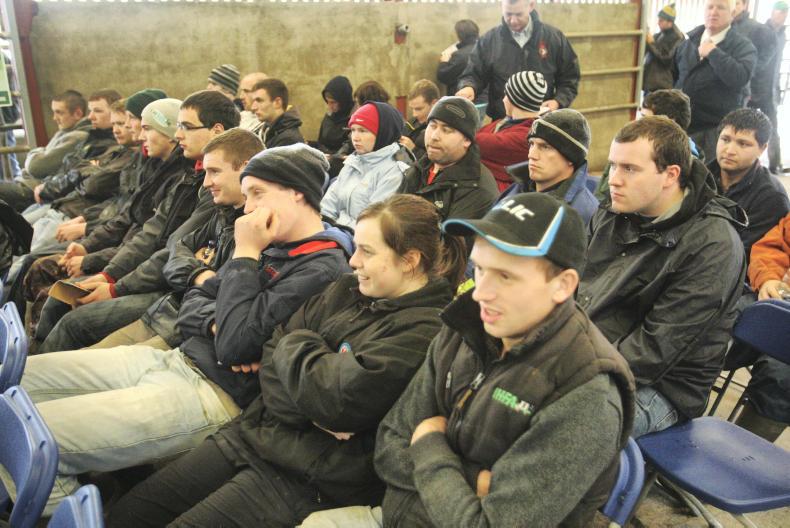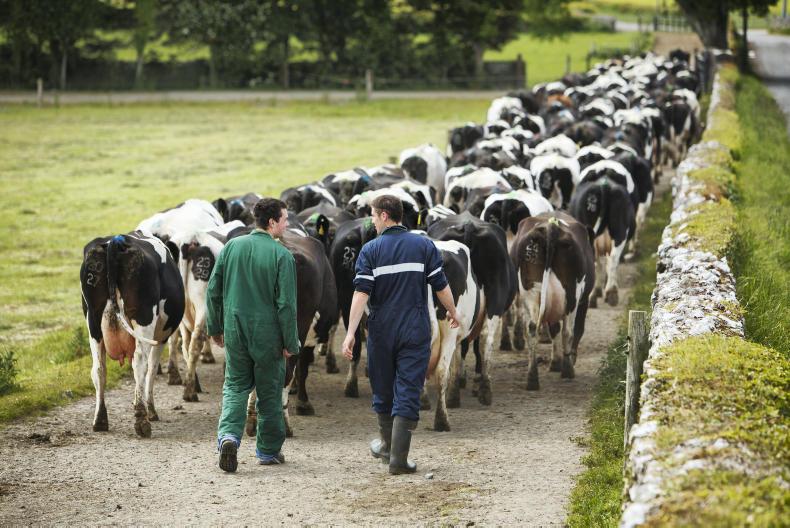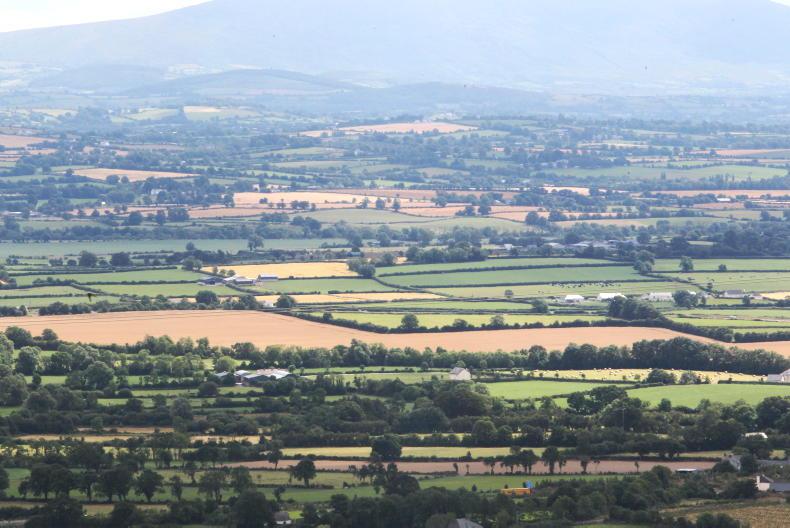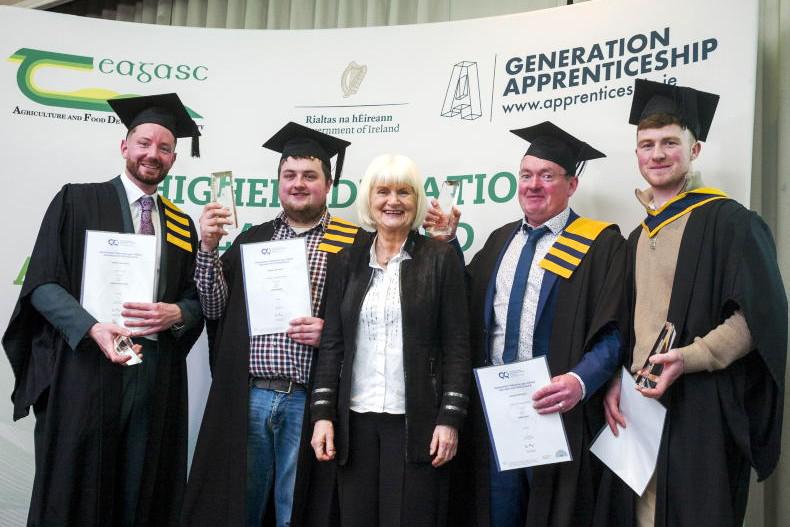Part-time farmers could be required to complete the Level 6 Advanced Cert in Agriculture in order to obtain the Green Cert in coming years, meaning more study time, in order to be recognised as a trained farmer.
Currently, these students complete the Level 6 Specific Purpose Certificate in Farming to get the Green Cert.
In 2019, students who started agricultural colleges all commenced the Level 6 Advanced Certificate in Agriculture, but part-time students are still studying the Specific Purpose Certificate.
Teagasc has now proposed that part-time students follow the full-time students and obtain the Advanced Cert. Irish Country Living understands that a meeting was held with Teagasc education staff and the Department in February 2020 to find out more about the proposal and its implications for part-time farmers.

Thomas Broderick, Galway, is pictured grass measuring a paddock as part of his training for the Green Cert distance Learning course he is doing at Gurteen Agricultural College, Co. Tipperary. Photo: Donal O' Leary
The Department, not Teagasc, will decide whether or not to upgrade part-time farmers to the Advanced Cert course, however in light of COVID-19 it does not think that the “timing is appropriate” to make changes to the course.
A Department spokesperson told Irish Country Living that “while the proposal is under consideration, there are no immediate plans for any changes to the educational requirements at this time”.
It is accepted that a transition period and appropriate consultation would be necessary before any change could be contemplated to the minimum agricultural education for trained farmer status, the Department has said.
Modern farming in changing times
Teagasc’s 2018 Education Vision Report says “it is recognised that the Level 6 Advanced Certificate in Agriculture may be a more appropriate minimum qualification for small scale and/or part-time farm owners”.
A Teagasc spokesperson said that the report involved a comprehensive consultation process with stakeholders.
“The consultation process, in considering the breadth and depth of future knowledge, skills and capability needs of modern farming in rapidly changing times, concluded that the minimum qualification requirement for trained farmers be the Level 6 Advanced Certificate in Agriculture as opposed to the Level 6 Specific Purpose award.
“Fulfilling the conclusions of the Education Vision exercise would require that the educational qualification requirements for farm schemes/incentives be changed. This is not something that Teagasc can effect but would like to engage with key stakeholders on,” he said.

At the Teagas Early Maturing Dairy Calf to Beef Trial Open Day at Johnstown Castle, Co Wexford, were Green Cert students from Kilmuckridge VEC.
Could this mean changes ahead for schemes in the next CAP? Potentially, but the European Commission, European Parliament and European Council are at loggerheads whether there should be a two-year CAP transition period.
The Commission is in favour of a one-year transition period, with the Parliament and Council in favour of a two-year transition.
Either way the current scheme requirements are safe for at least another year.
Department of Agriculture documents seen by Irish Country Living show that changing the minimum education standard for the Green Cert for part-time farmers would result in the following changes:
Part-time farmers would be required to achieve 70 additional credits – from 50 to 120 under the Advanced Cert.It equates to roughly 25% additional study time over the programme duration.Advanced Cert would be customised for part-time farmers to include credits for experiential learning.Programme content would be updated in relation to the environment and biodiversity.There is no proposal to increase fees arising from adoption of the Advanced Cert.Current Green Cert holders eligibility for ‘trained farmer’ status would not be impacted.There are two part-time Green Cert courses – the Distance Education Green Cert (for non-agricultural award holders) which runs for up to 18 months and the Part-Time Green Cert Programme which runs for up to two and a half years.
In the case of the distance education option, the changes could mean an extra 4.5 months of study while in the case of the part-time programme, it could mean an extra 7.5 months of study.

Obtaining the Green Cert has many benefits, with the student eligible to avail of the Young Farmers Scheme, National Reserve and a 60% Targeted Agricultural Modernisation Scheme (TAMS) grant.
He or she, once under the age of 35, is also exempt from paying stamp duty on land transfers, which currently stands at 7.5% and there are also benefits of holding a Green Cert for Capital Acquisitions Tax (CAT).
Tony Pettit, head of education at Teagasc, told Irish Country Living that applications for agricultural courses for the 2020-2021 academic year are “well in line with last year”.
Read more
'Blended learning' for incoming Green Cert students
Green Cert changes loom for part-time farmers
Part-time farmers could be required to complete the Level 6 Advanced Cert in Agriculture in order to obtain the Green Cert in coming years, meaning more study time, in order to be recognised as a trained farmer.
Currently, these students complete the Level 6 Specific Purpose Certificate in Farming to get the Green Cert.
In 2019, students who started agricultural colleges all commenced the Level 6 Advanced Certificate in Agriculture, but part-time students are still studying the Specific Purpose Certificate.
Teagasc has now proposed that part-time students follow the full-time students and obtain the Advanced Cert. Irish Country Living understands that a meeting was held with Teagasc education staff and the Department in February 2020 to find out more about the proposal and its implications for part-time farmers.

Thomas Broderick, Galway, is pictured grass measuring a paddock as part of his training for the Green Cert distance Learning course he is doing at Gurteen Agricultural College, Co. Tipperary. Photo: Donal O' Leary
The Department, not Teagasc, will decide whether or not to upgrade part-time farmers to the Advanced Cert course, however in light of COVID-19 it does not think that the “timing is appropriate” to make changes to the course.
A Department spokesperson told Irish Country Living that “while the proposal is under consideration, there are no immediate plans for any changes to the educational requirements at this time”.
It is accepted that a transition period and appropriate consultation would be necessary before any change could be contemplated to the minimum agricultural education for trained farmer status, the Department has said.
Modern farming in changing times
Teagasc’s 2018 Education Vision Report says “it is recognised that the Level 6 Advanced Certificate in Agriculture may be a more appropriate minimum qualification for small scale and/or part-time farm owners”.
A Teagasc spokesperson said that the report involved a comprehensive consultation process with stakeholders.
“The consultation process, in considering the breadth and depth of future knowledge, skills and capability needs of modern farming in rapidly changing times, concluded that the minimum qualification requirement for trained farmers be the Level 6 Advanced Certificate in Agriculture as opposed to the Level 6 Specific Purpose award.
“Fulfilling the conclusions of the Education Vision exercise would require that the educational qualification requirements for farm schemes/incentives be changed. This is not something that Teagasc can effect but would like to engage with key stakeholders on,” he said.

At the Teagas Early Maturing Dairy Calf to Beef Trial Open Day at Johnstown Castle, Co Wexford, were Green Cert students from Kilmuckridge VEC.
Could this mean changes ahead for schemes in the next CAP? Potentially, but the European Commission, European Parliament and European Council are at loggerheads whether there should be a two-year CAP transition period.
The Commission is in favour of a one-year transition period, with the Parliament and Council in favour of a two-year transition.
Either way the current scheme requirements are safe for at least another year.
Department of Agriculture documents seen by Irish Country Living show that changing the minimum education standard for the Green Cert for part-time farmers would result in the following changes:
Part-time farmers would be required to achieve 70 additional credits – from 50 to 120 under the Advanced Cert.It equates to roughly 25% additional study time over the programme duration.Advanced Cert would be customised for part-time farmers to include credits for experiential learning.Programme content would be updated in relation to the environment and biodiversity.There is no proposal to increase fees arising from adoption of the Advanced Cert.Current Green Cert holders eligibility for ‘trained farmer’ status would not be impacted.There are two part-time Green Cert courses – the Distance Education Green Cert (for non-agricultural award holders) which runs for up to 18 months and the Part-Time Green Cert Programme which runs for up to two and a half years.
In the case of the distance education option, the changes could mean an extra 4.5 months of study while in the case of the part-time programme, it could mean an extra 7.5 months of study.

Obtaining the Green Cert has many benefits, with the student eligible to avail of the Young Farmers Scheme, National Reserve and a 60% Targeted Agricultural Modernisation Scheme (TAMS) grant.
He or she, once under the age of 35, is also exempt from paying stamp duty on land transfers, which currently stands at 7.5% and there are also benefits of holding a Green Cert for Capital Acquisitions Tax (CAT).
Tony Pettit, head of education at Teagasc, told Irish Country Living that applications for agricultural courses for the 2020-2021 academic year are “well in line with last year”.
Read more
'Blended learning' for incoming Green Cert students
Green Cert changes loom for part-time farmers












SHARING OPTIONS